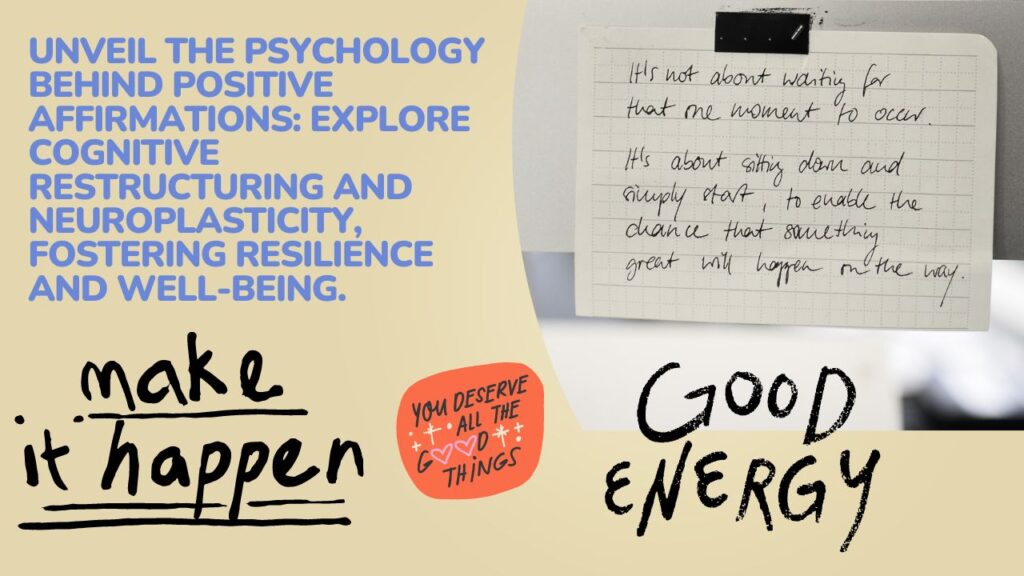
Positive affirmations have emerged as a popular psychological tool for fostering personal growth and emotional well-being. Grounded in the principles of cognitive restructuring, affirmations offer a pathway to challenge and transform negative thought patterns into more empowering beliefs. This paper explores the intricate interplay between psychology and neuroscience to unravel the mechanisms underlying the effectiveness of positive affirmations. Through an interdisciplinary lens, we delve into the concepts of cognitive restructuring, neuroplasticity, belief systems, and self-efficacy to elucidate how affirmations shape our cognition, emotions, and neural architecture. By understanding the underlying psychological dynamics, we can harness the full potential of positive affirmations to cultivate resilience, enhance self-esteem, and foster holistic well-being.
Introduction:
Positive affirmations have garnered widespread attention as a simple yet potent technique for promoting psychological well-being and personal development. Rooted in the principles of cognitive restructuring, affirmations involve the repetition of positive statements aimed at challenging and replacing negative self-perceptions and beliefs. This introductory section provides an overview of the paper’s objectives and outlines the key concepts to be explored, including cognitive restructuring, neuroplasticity, belief systems, and self-efficacy.
Cognitive Restructuring: Unpacking the Foundation of Affirmations
Understanding Negative Thought Patterns: This subsection delves into the nature of negative thought patterns and their impact on emotions, behavior, and self-perception. Drawing from cognitive-behavioral therapy (CBT) principles, we explore how maladaptive cognitions contribute to cycles of distress and dysfunction.
The Role of Cognitive Restructuring: Here, we elucidate the concept of cognitive restructuring as a core therapeutic technique for challenging and reframing negative thought patterns. By identifying cognitive distortions and replacing them with more balanced and adaptive interpretations, individuals can alleviate psychological distress and improve coping strategies.
Affirmations as Catalysts for Change: Building upon the foundation of cognitive restructuring, this subsection examines how positive affirmations serve as powerful tools for initiating and sustaining cognitive change. Through repetition and rehearsal, affirmations facilitate the integration of new, empowering beliefs, fostering a more optimistic and resilient mindset.
Neuroplasticity: Uncovering the Neural Substrates of Affirmation Practice
The Plastic Brain: This section provides an overview of neuroplasticity, highlighting the brain’s remarkable capacity to reorganize and adapt in response to experience. We explore the mechanisms underlying neuroplasticity, including synaptic plasticity, dendritic arborization, and neurogenesis, and discuss their implications for learning, memory, and emotional regulation.
Neural Correlates of Affirmation Practice: Drawing from neuroscientific research, we examine the neural correlates of affirmation practice. Neuroimaging studies utilizing techniques such as functional magnetic resonance imaging (fMRI) reveal changes in brain activity associated with affirmation tasks, including increased activation in regions implicated in self-referential processing and emotional regulation.
Structural Changes in the Brain: This subsection explores longitudinal studies documenting structural changes in the brain following sustained affirmation practice. Increased gray matter volume in regions such as the prefrontal cortex, hippocampus, and amygdala suggests a potential neurobiological basis for the observed improvements in self-esteem, stress reduction, and emotional well-being.
Belief Systems and Self-Efficacy: Amplifying the Impact of Affirmations
The Power of Belief: Here, we explore the role of belief systems in shaping the effectiveness of affirmation practice. Belief in the validity and efficacy of affirmations enhances their impact, influencing cognitive processes such as attention, interpretation, and memory retrieval.
Self-Efficacy and Empowerment: This subsection examines the concept of self-efficacy and its significance in the context of affirmation practice. By affirming statements that reinforce a sense of competence, resilience, and agency, individuals can enhance their confidence and motivation to pursue their goals.
Cultural and Individual Variability: Recognizing the influence of cultural factors and individual differences, we discuss the importance of tailoring affirmations to resonate with one’s unique identity, values, and cultural background. Acknowledging diverse perspectives enriches the applicability and effectiveness of affirmation interventions across diverse populations.
Limitations and Considerations: Navigating the Complexities of Affirmation Practice
Addressing Psychological Complexity: While affirmations offer promise as a tool for self-improvement, they may not be suitable for addressing deep-seated psychological issues or trauma requiring specialized therapeutic intervention. It is essential to recognize the limitations of affirmations and to supplement them with comprehensive treatment approaches when necessary.
Individual Differences and Contextual Factors: This subsection explores how individual differences in cognitive style, personality traits, and life circumstances can influence the effectiveness of affirmation practice. Tailoring affirmations to align with one’s unique needs and context enhances their relevance and impact.
Integrating Complementary Practices: Recognizing the synergistic effects of complementary practices, such as mindfulness meditation, gratitude exercises, and journaling, we discuss how integrating these approaches can amplify the benefits of affirmation practice. By fostering a holistic approach to well-being, individuals can cultivate resilience and enhance their overall quality of life.
Conclusion: Harnessing the Transformative Potential of Affirmations:
Positive affirmations offer a compelling pathway to promote cognitive restructuring, nurture neuroplasticity, and enhance belief systems and self-efficacy. By understanding the underlying psychological dynamics and neurobiological mechanisms, we can harness the transformative potential of affirmations to cultivate resilience, foster self-esteem, and promote holistic well-being. As we continue to explore the complexities of affirmation practice, it is essential to embrace a nuanced understanding of individual differences, cultural diversity, and the interplay between cognition, emotion, and neural plasticity. By integrating affirmations into comprehensive approaches to self-care and personal development, we can empower individuals to embark on a journey of self-discovery, growth, and flourishing.






